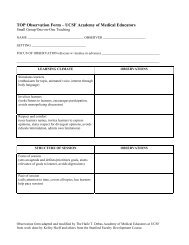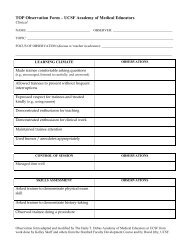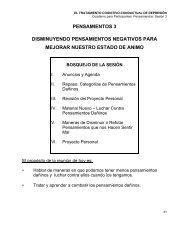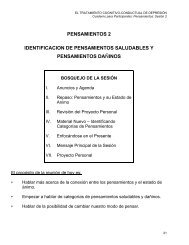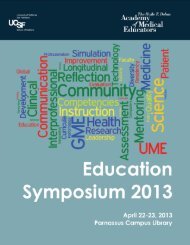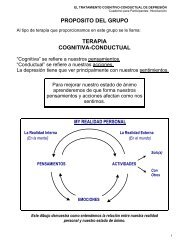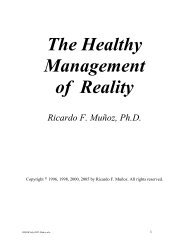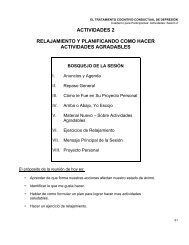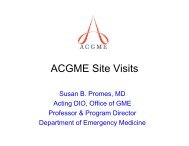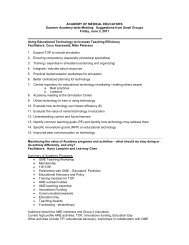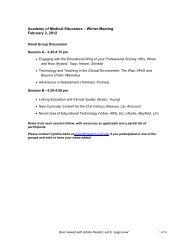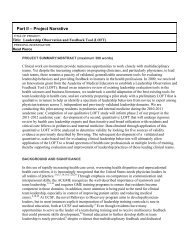<strong>UCSF</strong> Education Day <strong>2011</strong>Evaluation Plan: The module was used an average <strong>of</strong>two times per week. Students using the module weremore satisfied with the amount (p=0.07) and quality(p=0.02) <strong>of</strong> their feedback. Those using the moduleagreed they received more (p=0.02) and higher quality(p=0.06) feedback compared to other rotations duringthird year. All stated the CI module should be adoptedon more clinical rotations. Educators found it timeintensivebut discovered it helped hone their skill atgiving quality feedback.Dissemination: The module will be expanded to otherinstructors in the neurology department in the comingyear.Reflective critique: The number <strong>of</strong> students andeducators using the module was small, but the receptionfrom students was very positive. Educators may still findtime a major hurdle in implementation.Curriculum in DevelopmentalDisabilitiesClarissa Kripke, MD, <strong>UCSF</strong> Department <strong>of</strong> Family andCommunity <strong>Medicine</strong>, kripkec@fcm.ucsf.edu; GerriCollins-Bride, RN, ANP, Community Health Systems,<strong>UCSF</strong> <strong>School</strong> <strong>of</strong> Nursing, gerri.collinsbride@nursing.ucsf.eduAreas abstract covers: UME, GME, CMEDomain(s) addressed: Curricular Innovation, Diversity,Interpr<strong>of</strong>essional Education, Primary CarePurpose: The goal <strong>of</strong> this project is to increase thecompetence <strong>of</strong> health care pr<strong>of</strong>essionals to meet thehealth care needs <strong>of</strong> adults with developmentaldisabilities.Background: In 2006 an interagency collaborative wasestablished to identify barriers to health care for adultswith developmental disabilities and to develop a pilot toaddress them.Methods: The Office <strong>of</strong> Developmental Primary Care(ODPC) was established in the <strong>UCSF</strong> Department <strong>of</strong>Family and Community <strong>Medicine</strong> to bring together aninterpr<strong>of</strong>essional team <strong>of</strong> clinicians to develop training atthe predoctoral, residency and faculty developmentlevels. ODPC developed a curricular map, competenciesand an interpr<strong>of</strong>essional student interest group. Theteam worked with community partners to develop acomprehensive website and set <strong>of</strong> curricular materialsincluding practice pearls, health maintenancerecommendations, information on accessing services,sample power point presentations, empathy exercises,chart forms, links, policy papers and sample referralletters. The team has presented the content in didacticpresentations to over 1300 trainees in different healthdisciplines.Evaluation Plan: The Office <strong>of</strong> Developmental PrimaryCare is tracking hits and downloads to its website (over3000 per month). We are collecting evaluations at everydidactic session.Dissemination: ODPC has integrated a problem basedlearning case into the predoctoral medical schoolcurriculum, developed an elective, integrated a healthadvocate from the Arc <strong>of</strong> <strong>San</strong> Francisco into the familymedicine residency training site and developed diadacticpresentations for over 1300 trainees in variousdisciplines, locally and nationally. Content has beensummarized in a guide to clinical care for all medicalstudents and in a book chapter for nursing students.Reflective critique: Revising and expanding the trainingand web materials is an ongoing, iterative process andwe continue to partner with people with disabilities andtheir advocates in all <strong>of</strong> our curriculum development.Development <strong>of</strong> a LongitudinalReflective and Narrative MedicalWriting Course for Third Year MedicalStudentsEmily Whichard, MS4, <strong>University</strong> <strong>of</strong> <strong>California</strong> at <strong>San</strong>Francisco, emily.whichard@ucsf.edu; Margo Vener, MD,MPH, <strong>University</strong> <strong>of</strong> <strong>California</strong> at <strong>San</strong> Francisco,mvener@fcm.ucsf.edu; Louise Aronson, MD, <strong>University</strong><strong>of</strong> <strong>California</strong> at <strong>San</strong> Francisco,aronsonl@medicine.ucsf.eduAreas abstract covers: UMEDomain(s) addressed: Curricular Innovation,Longitudinal Educational Activities, Medical Humanities,ReflectionPurpose: To design a longitudinal writing course forthird year medical students to reflect on their transition toclinical medicine and advance <strong>of</strong> their public writingskills.Background: The literature describes reflection as atool for self-regulated life-long learning and development<strong>of</strong> pr<strong>of</strong>essional practice. The growing diversity <strong>of</strong> typesand venues for narrative medical writing presents anopportunity to help students translate reflective learninginto writings which effectively communicate their uniqueclinician experiences to colleagues and the public.Methods: Curriculum development consisted <strong>of</strong>: (1) aliterature review <strong>of</strong> public medical writing; (2) informalsurveys <strong>of</strong> course directors and medical students aboutreflection and writing interests and needs; (3) selection<strong>University</strong> <strong>of</strong> <strong>California</strong>, <strong>San</strong> Francisco • <strong>School</strong> <strong>of</strong> <strong>Medicine</strong> 17
<strong>UCSF</strong> Education Day <strong>2011</strong><strong>of</strong> exemplar readings <strong>of</strong> advocacy and narrative medicalwriting; (4) development <strong>of</strong> a series <strong>of</strong> structuredprompts; and (5) creation <strong>of</strong> a student syllabus andcompanion faculty teaching guide. We then piloted aseven-session course with Model SFGH volunteers in2010-<strong>2011</strong> and solicited their feedback on coursemethods and goals. We obtained Academic Senateapproval and recruited faculty for a 4-session,longitudinal, third year medical student course entitled“Public Medical Writing” to start in the <strong>2011</strong>-12 academicyear.Evaluation Plan: Evaluation will include tracking <strong>of</strong>student enrollment and retention in year one andenrollment in subsequent years, student preparation forsessions, and student completion <strong>of</strong> one short, revised,publication quality narrative medical writing piece. At theend <strong>of</strong> the course, students will complete courseevaluations and a knowledge test <strong>of</strong> public medicalwriting types and venues. Finally we will analyze studentwritings for writing, storytelling and reflective traits usingpreviously validated rubrics.Dissemination: Health & Society Works-in-Progress;Pathways to Discovery symposium; WGEA.Reflective critique: The final course reflects feedbackfrom third year course directors, Model SFGH directors,course pilot participants and other pathways learners.Four Primary Care ResidencyTraining Programs DevelopLeadership, Cultural Competence,and Community Advocacy andPartnership Curricula throughCollaborationSharad Jain, MD, <strong>UCSF</strong>, Sharad.Jain@ucsf.edu; CraigKeenan, UC Davis, craig.keenan@ucdmc.ucdavis.edu;Steve Roey, <strong>San</strong>ta Clara Valley Medical Center,Steve.Roey@hhs.sccgov.org; Kathleen Hicks, AlamedaCounty Medical Center, khicks@acmedctr.orgValley Medical Center) that provide care to underservedpopulations and the development <strong>of</strong> a curriculum thataddresses topics on leadership, advocacy, communitypartnerships, and cultural competency.Methods: Program leadership worked together todevelop training models that can be implemented,evaluated, and ultimately disseminated to a broaderaudience <strong>of</strong> residency training programs. The process <strong>of</strong>developing a comprehensive curriculum for medicineresidents to learn these core topics requiredcollaboration to (1) perform an assessment <strong>of</strong> currentcurricula being delivered and compare these curriculawith the literature and national guidelines, (2) implementcurricular design to facilitate delivery at programs withwide variations in schedules and logistics, and (3)document the impact <strong>of</strong> these innovations on residentphysicians’ knowledge, skills, and attitudes.Evaluation Plan: The impact <strong>of</strong> the curriculum onresidents is currently being assessed using pre- andpost- surveys. Informal survey <strong>of</strong> faculty and residentsinvolved in the curricula demonstrated great satisfactionwith the process and ease <strong>of</strong> delivery with thecurriculum.Dissemination: Collaboration with specific curricularobjectives provides a valuable method for rapiddevelopment and delivery <strong>of</strong> curricula to addressdisparities among training physicians and proved aninvaluable technique that is both transferable and flexibleto fit individual programs’ needs. We also believe thatthis process had significant beneficial impact on facultydevelopment. We plan to disseminate our work throughpresentations at various meetings and to make ourcurriculum available to other programs.Reflective critique: We await learner feedback throughour surveys, as well as from our dissemination efforts.This feedback will help improve the curriculum.Areas abstract covers: GMEDomain(s) addressed: Community <strong>Medicine</strong>, CurricularInnovation, LeadershipPurpose: Physicians, especially those working in safetynet systems, must be trained to address disparitiesserving as "agents <strong>of</strong> change" to improve outcomes fortheir patients.Background: We describe a collaborative processamong four primary care medicine residency trainingprograms (<strong>UCSF</strong>/SFGH, Alameda County MedicalCenter, <strong>University</strong> <strong>of</strong> <strong>California</strong>, Davis, and <strong>San</strong>ta Clara18 The Haile T. Debas Academy <strong>of</strong> Medical Educators



